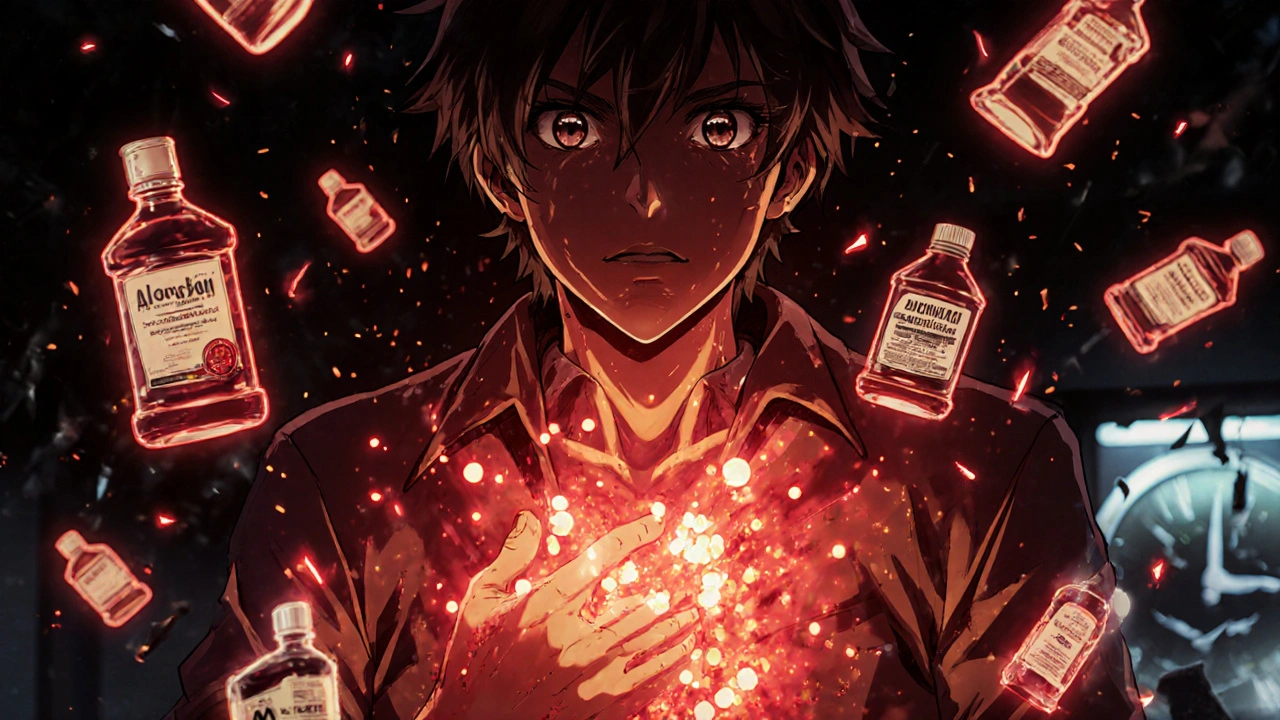Stopping alcohol use isn’t just about willpower. For many people, it’s a medical battle. Antabuse (Disulfiram) has been around since the 1940s and works by making alcohol taste like poison-literally. But it’s not the only option anymore. If you’re considering Antabuse, you deserve to know what else is out there, what works better for different people, and what side effects you might actually live with.
How Antabuse (Disulfiram) Actually Works
Antabuse doesn’t reduce cravings. It doesn’t ease withdrawal. It doesn’t make you feel calm or happy without alcohol. Instead, it punishes drinking. When you take Disulfiram and then drink alcohol, your body can’t break down acetaldehyde-a toxic byproduct of alcohol metabolism. That buildup causes flushing, nausea, vomiting, rapid heartbeat, and sometimes chest pain. The reaction can start within minutes and last for hours.
This isn’t a mild inconvenience. People describe it as feeling like they’re being crushed from the inside. That’s the point. The fear of this reaction is meant to stop people from drinking. But fear doesn’t work for everyone. Some people skip doses. Others drink anyway, risking severe reactions. Emergency rooms see cases every year from people who drank while on Antabuse-even accidentally, from mouthwash or cough syrup.
Why Antabuse Falls Short for Many
Antabuse only works if you take it every single day. Miss a dose? The protection fades in about 24 hours. That means you need perfect adherence. For someone struggling with addiction, that’s a tall order. Studies show that only about 10% to 20% of people stay on Antabuse for more than six months.
It also doesn’t help with the mental side of addiction. If you’re drinking to cope with anxiety, trauma, or depression, Antabuse won’t touch those roots. It just makes the consequences worse. And if you relapse after stopping the drug, your tolerance is lower-you’re at higher risk of overdose.
Plus, it’s not safe for everyone. People with liver disease, heart conditions, or severe psychiatric disorders are often told to avoid it. And it interacts with dozens of common medications, from metronidazole to certain antidepressants. Your doctor has to check your full medication list before prescribing it.
Alternative #1: Naltrexone (Revia, Vivitrol)
Naltrexone is an opioid blocker. It doesn’t make you sick when you drink. Instead, it reduces the pleasurable effects of alcohol. If alcohol usually gives you a rush, naltrexone dulls that. Over time, drinking becomes less rewarding-and less tempting.
It comes in two forms: a daily pill (Revia) or a monthly injection (Vivitrol). The injection removes the need for daily adherence. That’s a game-changer for people who forget pills or struggle with routine.
Research shows naltrexone cuts heavy drinking days by about 25% compared to placebo. It also reduces the chance of full relapse. Side effects are mild: nausea (especially at first), headaches, dizziness. It’s safe for people with liver disease, unlike Antabuse. And it doesn’t cause dangerous reactions with alcohol-so there’s no risk of a life-threatening response if you slip up.
Alternative #2: Acamprosate (Campral)
Acamprosate works on brain chemistry, not punishment. It helps restore balance in the neurotransmitters that get messed up by long-term alcohol use-especially glutamate and GABA. Think of it as calming the nervous system after years of alcohol abuse.
It doesn’t stop you from drinking, but it reduces the urge to drink after you’ve stopped. People who’ve completed detox often report fewer cravings and less anxiety when taking acamprosate.
Studies show it increases the number of days people stay abstinent. It’s most effective when taken with counseling. Side effects are usually mild: diarrhea, gas, or feeling anxious. It’s safe for people with liver problems and doesn’t interact with most medications.
But you have to take it three times a day. That’s a lot. And it doesn’t help with the initial withdrawal phase. You need to be alcohol-free for at least 5-7 days before starting it.

Alternative #3: Topiramate (Topamax)
Topiramate was originally an epilepsy and migraine drug. But in the 2000s, researchers noticed patients on it drank less. Since then, it’s been studied for alcohol use disorder-and it works.
It reduces cravings and makes alcohol less appealing. It also helps with mood stabilization, which is helpful if anxiety or depression drives drinking.
One 2019 trial found topiramate was more effective than naltrexone at reducing heavy drinking days. But it comes with trade-offs. Side effects include tingling in hands and feet, memory problems, trouble finding words, and a metallic taste in the mouth. Some people can’t tolerate it.
It’s not FDA-approved for alcohol use, but it’s prescribed off-label by specialists. It’s not a first-line option, but for people who haven’t responded to other drugs, it’s worth discussing.
Alternative #4: Baclofen
Baclofen is a muscle relaxant-but in France and parts of Europe, it’s commonly used for alcohol dependence. It works on GABA-B receptors in the brain, which helps reduce cravings and anxiety around alcohol.
Some people with severe alcohol dependence say baclofen lets them drink less or stop entirely without the terror of withdrawal. It’s especially helpful for those who drink heavily every day and fear quitting cold turkey.
But it’s not approved for this use in the U.S., Canada, or New Zealand. Doses can be high, and side effects include drowsiness, dizziness, and muscle weakness. It also carries a risk of overdose if misused.
It’s not a mainstream option, but for some, it’s the only thing that’s worked after other treatments failed.
Comparison Table: Antabuse vs. Alternatives
| Medication | How It Works | Dosing | Key Side Effects | Best For |
|---|---|---|---|---|
| Antabuse (Disulfiram) | Causes severe reaction when alcohol is consumed | Once daily | Flushing, nausea, vomiting, rapid heartbeat, liver toxicity | People highly motivated by fear of consequences |
| Naltrexone | Blocks alcohol’s pleasurable effects | Daily pill or monthly injection | Nausea, headache, dizziness | Those who want to reduce drinking without punishment |
| Acamprosate | Stabilizes brain chemistry after quitting | Three times daily | Diarrhea, anxiety, gas | People post-detox with persistent cravings |
| Topiramate | Reduces cravings and alters reward response | Once or twice daily | Tingling, memory issues, metallic taste | Those with co-occurring anxiety or failed other treatments |
| Baclofen | Reduces cravings via GABA-B receptors | Two to three times daily | Drowsiness, dizziness, muscle weakness | Heavy daily drinkers afraid of withdrawal |

Which One Is Right for You?
There’s no universal best drug. What works for one person might fail for another. Your choice depends on your goals, your history, and your lifestyle.
If you’re terrified of drinking again and want a strong deterrent, Antabuse might feel like the only option. But if you’ve tried it and quit because the side effects were too scary-or you just couldn’t stick with it-naltrexone is a safer, more sustainable alternative.
If you’ve already stopped drinking but can’t stop thinking about it, acamprosate might be your best bet. If you’ve tried everything and still struggle, topiramate or baclofen could be worth exploring with a specialist.
None of these drugs work alone. Counseling, support groups like Alcoholics Anonymous, and lifestyle changes are just as important. Medication helps you stay in the game. Therapy helps you learn why you’re playing.
What to Do Next
Don’t switch meds on your own. Talk to your doctor or an addiction specialist. Bring a list of your current medications, your drinking patterns, and what you’ve tried before. Ask:
- Have I tried the right combination of medication and therapy?
- Could a monthly injection like Vivitrol help me stay consistent?
- Am I being prescribed a drug that fits my real-life challenges-not just my diagnosis?
Recovery isn’t about finding the perfect pill. It’s about finding the right support system-and the right tools to keep showing up for yourself.
Can you drink alcohol while taking Antabuse?
No. Drinking alcohol while on Antabuse causes a severe and potentially dangerous reaction, including vomiting, chest pain, rapid heartbeat, and difficulty breathing. Even small amounts-from mouthwash, cough syrup, or food cooked in alcohol-can trigger it. The reaction can last for up to two weeks after the last dose of Antabuse.
Is naltrexone better than Antabuse?
For most people, yes. Naltrexone reduces cravings and the pleasure of drinking without causing dangerous reactions. It’s safer, better tolerated, and more effective at keeping people in treatment long-term. Antabuse relies on fear, which often fails. Naltrexone works with your brain, not against it.
Does acamprosate help with withdrawal symptoms?
No. Acamprosate doesn’t help with the first few days of withdrawal. It’s meant for people who have already completed detox and are now trying to stay sober. It reduces the long-term cravings and anxiety that often lead to relapse.
Can you take Antabuse with other medications?
Many medications interact with Antabuse. It can cause dangerous reactions with metronidazole, certain antidepressants, and even some over-the-counter cold medicines. Always give your doctor a full list of everything you take-prescription, OTC, supplements, and herbal remedies.
Is there a cure for alcohol addiction?
There’s no single cure. Addiction is a chronic condition, like diabetes or hypertension. Medications like Antabuse, naltrexone, or acamprosate help manage it, but long-term recovery requires ongoing support-therapy, peer groups, lifestyle changes, and sometimes continued medication. Success means staying sober for months or years, not just days.
Final Thoughts
Antabuse was revolutionary in its time. But medicine has moved on. Today, we understand addiction as a brain disorder-not a moral failing. The goal isn’t to scare people into sobriety. It’s to help them rebuild their lives.
There are safer, more effective options than Antabuse. And if one didn’t work for you, it doesn’t mean you failed. It just means you haven’t found the right fit yet.
Talk to your doctor. Ask about alternatives. Give yourself permission to try something new. Recovery isn’t about sticking with the first thing you’re offered. It’s about finding what lets you live-truly live-without alcohol.

